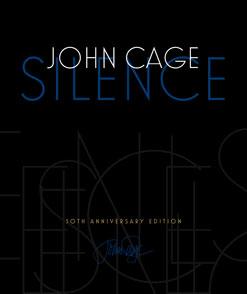
Publish Date |
October 26, 2011 |
Category |
Literary Criticism Art |
Price |
$ |
Silence, A Year from Monday, M, Empty Words and X (in this order) form the five parts of a series of books in which Cage tries, as he says, "to find a way of writing which comes from ideas, is not about them, but which produces them." Often these writings include mesostics and essays created by subjecting the work of other writers to chance procedures using the I Ching (what Cage called "writing through").
John Cage is the outstanding composer of avant-garde music today. The Saturday Review said of him: "Cage possesses one of the rarest qualities of the true creator- that of an original mind- and whether that originality pleases, irritates, amuses or outrages is irrelevant." "He refuses to sermonize or pontificate. What John Cage offers is more refreshing, more spirited, much more fun-a kind of carefree skinny-dipping in the infinite. It's what's happening now." –The American Record Guide
"There is no such thing as an empty space or an empty time. There is always something to see, something to hear. In fact, try as we may to make a silence, we cannot. Sounds occur whether intended or not; the psychological turning in direction of those not intended seems at first to be a giving up of everything that belongs to humanity. But one must see that humanity and nature, not separate, are in this world together, that nothing was lost when everything was given away."
His teacher, Arnold Schoenberg, said JOHN CAGE was "not a composer but an inventor of genius." Composer, author, and philosopher, John Cage was born in Los Angeles in 1912 and by the age of 37 had been recognized by the American Academy of Arts for having extended the boundaries of music.
ISBN: 9780819571762
Format: Hardback
Pages: 312
Publisher: Wesleyan University Press
Published: October 26, 2011
"As the unchallenged father figure of American experimental music, Mr. Cage wields an influence that extends far beyond sound alone....Indeed, the entire American avant-garde would be unthinkable without Mr. Cage's music, writings, and genially patriarchical personality."—John Rockwell, The New York Times
"One of the most entertaining and rewarding intellectual voyages that contemporary literature affords."—San Francisco Chronicle
"Silence starts with the finest dedications of modern times—'To Whom It May Concern'—and past that you embark on one of the most entertaining and rewarding intellectual voyages that contemporary literature affords."—Alfred Frankenstein, San Francisco Chronicle
"'I have nothing to say, and I am saying it.' The line, probably John Cage's most famous statement, appears three times over in his book Silence, which Wesleyan University Press has reissued in a smart fiftieth anniversary edition that also coincides with the centenary of the author's birth. A self-devouring paradox, Cage's modest avowal neatly draws attention to the impossibility of saying nothing, for once a frame of communication has been set up, be that frame a book or a musical score, a sheet of paper mounted in a gallery space or a performance scheduled in a concerthall (and Cage worked in all these media), emptiness will speak."—Paul Griffiths, Times Literary Supplement
"As the unchallenged father figure of American experimental music, Mr. Cage wields an influence that extends far beyond sound alone.Indeed, the entire American avant-garde would be unthinkable without Mr. Cage's music, writings, and genially patriarchical personality."—John Rockwell, The New York Times
"Of all Cage's books, it is perhaps the first, Silence, which has had the broadest impact. Even now, artists of all sorts continue to respond to its Zen principles, its chance procedures, and its revolutionary ideas about sound, silence, form, and time"—Dance Chronicle
"Prefacing the handsome 50th anniversary edition of Cage's seminal collection of writings, Silence, is an introductory essay by Bard College's Kyle Gann. Cage's writing can be hard going—it's often more modernist poetry than prose essay—but Gann invites readers to appreciate the composer's call to slip the bonds of logic, to stop making sense and transcend the artistic ego. Merrily thumbing his nose at ambition and desire in the arts, Cage's writings should be carefully considered in a world where the narcissism of self-expression threatens to occlude all else."—David Luhrssen, Shepherd Express
"Kyle Gann has written a breezy and often informative foreword that includes the principal events of Cage's life, some reminiscences, some interesting critical remarks on selected essays, and—most helpful—a list of names and biographical sketches of characters that populate Cage's entertaining anecdotes."—American Record Guide
"Cage's 1959 'Lecture on Nothing'remains a touchstone for artists thinking about how to empty their work of themselves. It has just reappeared in a 50th anniversary edition of Cage's classic first book, Silence."—Kenneth Baker, San Francisco Chronicle
"'It's the book I've reread most often in my life,' writes the composer-critic Kyle Gann in his illuminating foreword to the 50th anniversary edition. To reread Silence today is to see how complex, playful, but also deeply ironic Cage's seemingly upbeat and casual aesthetic really was."—Marjorie Perloff, Los Angeles Review of Books
"As the unchallenged father figure of American experimental music, Mr. Cage wields an influence that extends far beyond sound alone. . . . Indeed, the entire American avant-garde would be unthinkable without Mr. Cage's music, writings, and genially patriarchical personality."—John Rockwell, The New York Times
"Of all Cage's books, it is perhaps the first, Silence, which has had the broadest impact. Even now, artists of all sorts continue to respond to its Zen principles, its chance procedures, and its revolutionary ideas about sound, silence, form, and time."—Dance Chronicle